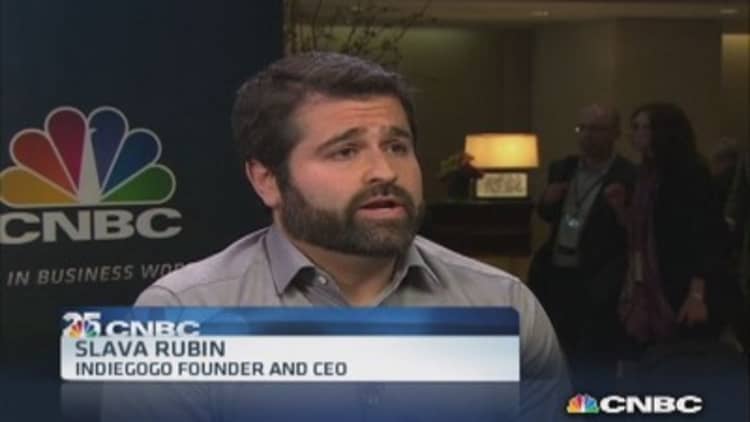When Lynne Weaver, founder of Three Weavers Brewing, wanted to open a tasting room at her Inglewood, California, craft beer brewery, she did what an increasing number of women-owned businesses are doing: She turned to Kickstarter, the online crowdfunding site, to raise the money.
Earlier this year, Weaver and her partners set a goal of $25,000 to create the tasting room, which will also be used as a gallery for local artists. By early April the brewery had shot past its goal, raising $25,422 from 166 backers. Each person received a donation reward ranging from hats and pint glasses for a $12 donation to a private dinner at the brewery and an invite to the tasting room's pre-opening party in June for those offering up $1,000 or more.
Getting traditional financing for a woman-owned start-up is tough enough. When the business is in a male-dominated field like craft beer, the hurdles are even higher, said Sherwood Neiss, a principal at Crowdfund Capital Advisors, a global consulting firm that works with entrepreneurs and others on early stage financing. Alternative funding options, such as Kickstarter and Indiegogo, are helping women overcome many of the barriers to capital and are exposing them to a wide network of supporters.
And recent studies show that women are having success—in many cases more so than men—when it comes to raising capital online via crowdfunding. This is in stark contrast to the experience women have with attracting venture capital money. While women own 41 percent of all businesses, research shows that only 8 percent of the ventures backed by professional investors are founded by women.
Activist investors lend support
Ethan Mollick, an assistant professor at the University of Pennsylvania's Wharton School of Business, together with Professor Jason Greenberg at New York University, recently looked into the success of women on Kickstarter. They examined 1,250 projects in five categories that sought at least $5,000 between 2010 and 2012. What they discovered was that women were 13 percent more likely than men to meet their Kickstarter goals.
"When you look across the research on raising capital, you see all these biases built in," Mollick explained. "For example, the mean distance between a company and the venture capital firm that invests in it is only 80 miles. People who VCs invest in are overwhelmingly white males from good schools. You either believe that those are the only people with good ideas in America, or else there is something inherently biased about the system that we hope crowdfunding overcomes."
Mollick's study also found that in technology—an area where women are typically underrepresented—they fared even better. According to his research, roughly two-thirds of the tech firms started by women reached their fundraising goal on Kickstarter, compared with just 30 percent of the technology companies founded by men.
"It seemed on Kickstarter, that if you thought women were underrepresented in technology, you viewed the projects created by women as better than the projects created by men," he explained. "This sort of activist investor base lets people have different motivations for investing and possibly helps overcome some of the biases that have existed for women."
The crowdfunding testing ground
Of course, crowdfunding isn't the same as equity investing or bank financing. Kickstarter and Indiegogo projects reward donors with T-shirts or invitations to a gallery opening, not equity in the company. Still, Mollick and others say that what these sites do is help determine market demand for a given product or service.
For instance, Debbie Sterling started her company, GoldieBlox, a toy company that promotes engineering concepts for girls, with a Kickstarter campaign in 2012. The goal was to raise $150,000. She wound up attracting $285,000 and within a few months had $1 million in preorders. Today the line of toys is sold in Toys R Us, Amazon and more than 1,000 retailers across the country.
Rory Eakin is the co-founder and chief operating officer of CircleUp, an online investing platform that connects consumer goods and retail companies with wealthy individuals, or what Eakin calls "accredited investors." He reports that 70 percent of the women-led start-ups on CircleUp have raised money, compared with just 58 percent of the companies started by men. "These are not smaller ventures," he said. "The women are asking for the same amount of money as the men."
And with CircleUp's focus on consumer goods and retail—rather than male-dominated sectors such as technology—there is a greater chance that women will get the start-up money they need. "Venture capital investors typically gravitate toward technology companies," Eakin said. "We're filling a void in the ladder of capital that exists in the consumer goods market, a segment that represents 20 percent of the U.S. economy. The businesses on our site are raising an average of $1 million."
With women getting their share of the money to run and expand their companies, Eakin believes the historical barriers to funding are starting to fall. "Crowdfunding in general speaks more to the fundamentals of a business than traditional venture capital does," he said. "That's good for investors and good for the women who are out there starting and running their own companies."
—By Susan Caminiti, special to CNBC.com






